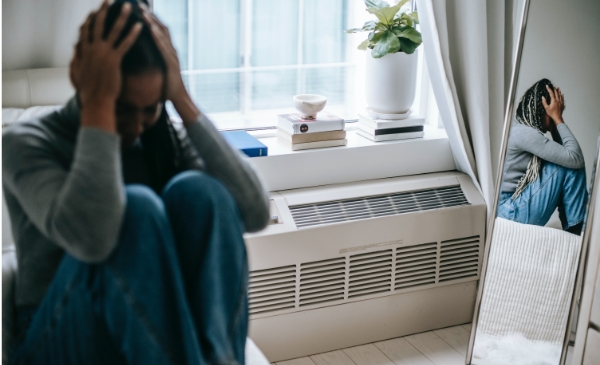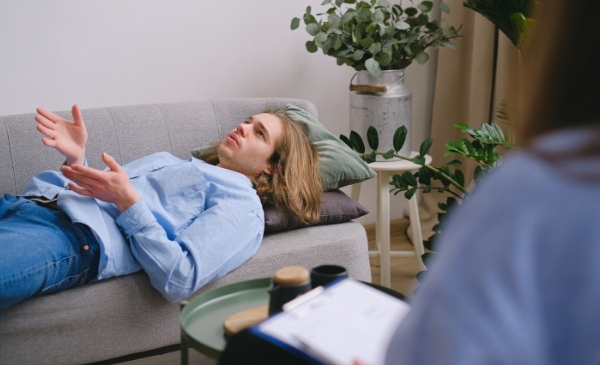Anxiety is inherent to people, that is, it is part of the human being and is a natural response to situations of danger or threat, anxiety allows people to adapt to the daily demands of the environment in which they move. What happens when anxiety goes from being a natural response to external situations to an anxiety disorder?
To address the issue completely and from a professional perspective, we interviewed Clinical Psychologist Karen Trujillo Hernández, who told us, from her specialty, everything about anxiety disorder.
What is anxiety disorder and what are its symptoms?
Anxiety disorders are those that share characteristics of excessive fear and anxiety, as well as associated behavioral disturbances.
Fear is an emotional response to an imminent threat, real or imagined, while anxiety is an anticipatory response to a future threat.

It is evident that both answers overlap, although they can also be differentiated; with fear being frequently associated with bouts of autonomic activation necessary for defense or flight, thoughts of imminent danger, and flight behaviors, and anxiety is more often associated with muscle tension, vigilance in relation to future danger, and cautious behaviors or avoidant.
This disorder can produce various physical or mental symptoms, each body manifests it in a different way, we call this somatization. Usually, we somatize through some system (muscular, digestive, nervous, etc.).
People can have any symptoms such as hair loss, muscle aches, headaches, bruxism, there are thousands of symptoms associated with anxiety, choosing one is not so easy.
What can have a list of characteristic symptoms are specific disorders, such as panic disorder, which already has a list of very specific symptoms where people who suffer from it have tingling, a feeling of losing their sanity, sensations like wanting to run away , tremors in the body, etc.
2. What is the difference between anxiety and anxiety disorder?
This disorder can be felt by all human beings when we are faced with a situation that exceeds our comfort or control zone, that is, we do not know what awaits us or we feel that we are not prepared for the consequences of that situation.

While this disorder is already a specified diagnosis, where the person is evaluated through a clinical interview and diagnostic criteria questionnaires to confirm the pathology, which needs psychotherapeutic and sometimes pharmacological treatment.
3. Can anxiety disable a person?
Depending on the type of anxiety disorder and its severity. But it is possible that the person is limited to do their daily activities if they have an anxiety crisis.
We will mention some types of anxiety disorders:
- Panic attacks (anxiety crisis, panic attack, panic attack)
- Agoraphobia
- Specific phobia (F40.02)
- Social phobia (F40.1)
- Obsessive-compulsive disorder (F42.8)
- Post-traumatic stress disorder (F43.1)
- Acute stress disorder (F43.0)
- Generalized anxiety disorder (F41.1)
- Anxiety Disorder Due to a General Medical Condition (F06.4)
- Substance-Induced Anxiety Disorder
4. What diseases can be confused with it?
Many other types of disorders have anxious symptoms in common, which is why it is often confused with:
- Depression.
- Distress.
- Crisis of panic.
- Obsessive-compulsive disorder.
- Posttraumatic stress.
You can read: Everything you need to know about depression
Some symptoms of anxiety manifest themselves physically: tachycardia, excessive sweating and concentration disorder are some. That is why it is better to seek professional help to receive a concrete diagnosis.
5. What can be done in case of an anxiety attack?
What is indicated would be a combination of interventions such as psychoeducation (learning to identify situations that generate the crisis or symptoms prior to the crisis), exposure to symptoms or situations, cognitive restructuring, breathing and relaxation techniques.
I like to combine deep breathing with cognitive restructuring. It is about breathing slowly and deeply and, at the same time, imagining that when you inhale the air you receive what you need at that moment. For example peace, love, calm (something positive). And when you exhale imagine that the negative emotion, for example, nervousness, anxiety, fear or anger, leaves your body.

6. Can this disorder develop other diseases?
Usually, many physical illnesses are treated as purely physiological pathologies, but it is not visible that their origin is possibly an undiagnosed disorder, an example of which is gastritis, a sleep disorder.
There is also comorbidity (comorbidity is the coexistence of two or more psychological/psychiatric illnesses in the same patient) to suffer from other types of disorders, such as mood disorders, addictions, eating and metabolic disorders.
7. How is a patient diagnosed with anxiety?
The patient requires psychological or psychic intervention, the most appropriate is psychotherapy, where a structured interview will be carried out to confirm symptoms of one or two disorders, later the criteria of the diagnostic manual of the clinical suspicions that the specialist may have will be applied and so on. The diagnosis will be confirmed and it will be classified.
8. How do you feel when you have an anxiety crisis?
To better understand this disorder, we asked a patient with generalized disorder: How do you feel when you have a crisis? and this is what he replied:
My heart accelerates at 100%, to the point of feeling that I will have a heart attack, which in the end stops and I will die; my breath shortens I look for a way to find oxygen I feel like I'm suffocating; my body trembles, my hands get out of control, I can't walk, that's the moment when I feel weakest, I cried and screamed, if I don't scream I don't feel good, if I scream I feel like I'm recovering, it's as if my body demands that I I broke free.
Before this happens to me I feel off, sad, I don't feel hungry or want to get out of bed, after I recover I feel as if electricity had passed through my body, like when you accidentally pass electricity and I have that feeling for days and she was tired.
I know that I have to do things to avoid these crises and get out of certain thoughts that these episodes entail, it is my daily struggle, before I was afraid now I have learned to know myself, understand myself and accept myself more.



